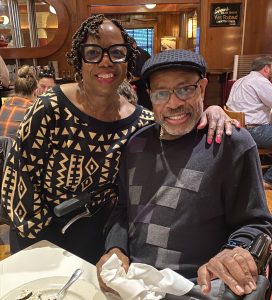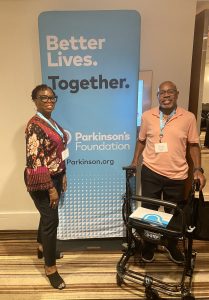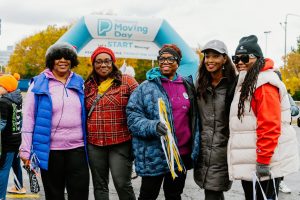Advocates for Parkinson’s research keep on fighting
By Kevin Beese Staff Writer — October 2, 2024
Phyllis and James Higgins of Streamwood. Phyllis Higgins has become an advocate for Parkinson’s patients after her husband and father were both diagnosed with the disease in 2020. (Provided photo)
When James Higgins fell on his way to the parking lot after a Ravinia concert, he shrugged it off as probably having too many glasses of wine.
“Pretty soon, he stopped saying that nothing was wrong,” his wife, Phyllis, said. “When one of his legs started dragging, we went to a neurologist.”
Doctors at Rush Medical Center did extensive tests and diagnosed James as having Parkinson’s disease.
“We didn’t know anything about Parkinson’s other than Michael J. Fox had it,” Phyllis said.
Shortly after her husband’s diagnosis, the Streamwood woman learned that her father, Johnnie Franklin, continued to arrive at his doctor’s appointments in Miami in mismatched clothes and sneakers, and skipping his trademark cologne. His physician alerted Phyllis that she suspected he might have dementia.
Johnnie was always an impeccable dresser, so while this was a subtle change in behavior, it was enough to concern his doctor and motivate Phyllis to visit him in Florida where they consulted a neurologist.

Phyllis and James Higgins. James has gone from a cane to a walker to aid in his mobility as his Parkinson’s progresses. (Provided photo)
Johnnie was diagnosed with Parkinson’s disease and Lewy body dementia; although two distinct disorders, they share the same underlying changes in the brain and very similar symptoms.
Every other month for more than two years, Phyllis traveled from her home in Streamwood to Miami to care for her dad until he died in May 2023.
As her father’s caregiver, Phyllis drew on her experience as an advocate and care partner for her husband James, who has been living with Parkinson’s since January 2020.
“I thought, ‘God, you must have a plan for me, but you’re picking the wrong person. I don’t know anything about this disease,’” Phyllis Higgins said.
When James was diagnosed, the couple tried to find a support group.
“But no one looked like us. The people were older and had much more advanced Parkinson’s,” she recalled.
Through Rush, they were able to find a Black Parkinson’s support group.
“I kept thinking, ‘There must be a reason God picked me to have two people in my life with Parkinson’s.”
Raising funds
That reason may be to raise awareness of Parkinson’s and to raise funds for research.
Last year, the couple came back from a support gathering in Atlanta with Phyllis thinking there has be
a walk in the Chicago area for Parkinson’s research.
“I saw there was a walk in Chicago, but I found out just three weeks before the walk. I joined and raised $1,700,” Phyllis Higgins said. “I said, ‘Let’s see what happens next year when I actually try.’”

Phyllis Higgins (center) with NBC 5 News’ Regina Waldroup (second from right) and members of Higgins’ Team Steady Steppers, Striders and Shakers at the 2023 Moving Day Chicago. (Provided photo)
So far, Higgins and her team of family and friends have already surpassed their goal of $6,000 for Moving Day Chicago, which will be Saturday in Soldier Field’s South Lot. The event honors people living with Parkinson’s disease, raises awareness, supports the work of the Parkinson’s Foundation and celebrates movements proven to help manage Parkinson’s symptoms.
Higgins hopes she can finish as one of the top five individual fund-raisers at Saturday’s event.
Phyllis Higgins will also be a speaker at Saturday’s event.
She is also getting fundraising support from her employer, Zurich Insurance. Phyllis will also be on a Zurich internal podcast talking about being a care partner.
“I am not a caregiver. My husband is capable of making decisions,” she emphasized.
Higgins said it is important to raise awareness of the disease among Blacks.
“People in the Black community may not be at a certain economic level and not go to a doctor for issues. They may just think they are getting older,” she said. “It is important to get the information out there.
“Parkinson’s is not a death sentence. You can live with it. It is not a club you want to be in, but you can still have a quality life, if you get help … If I can reach one person with what I do, it matters.”
She said she has taken it upon herself to be an advocate for Parkinson’s patients and research.
“You can’t be afraid. You need to step forward and be part of the solution,” Higgins said. “It takes all of us, not just one ethnic group.”
Higgins said she now knows why she has had two family members diagnosed with Parkinson’s.
“The reason God chose me is that he knew that I would make the best of this and do what I can to help,” she said.
Research efforts
Dr. Paulina Gonzalez Latapi, a movement disorders specialist with Northwestern Medicine, said events like Moving Day Chicago are vital for raising money for Parkinson’s research.
“Funding is crucial,” she said “There are a lot of cost associated with drug trials. Having the resources to carry out the trials is very important.
“Putting resources into funding research and advancing knowledge makes more people aware and contributes to carrying out research which can allow for a break-through to happen.”
Gonzalez Latapi said when celebrities like football star Brett Favre are diagnosed with Parkinson’s it put a spotlight on the affliction.
“It shows that Parkinson’s can affect anyone. His diagnosis can help with research of how concussions contribute to Parkinson’s,” the movement disorders specialist said. “Michael J. Fox has done such incredible work on behalf of Parkinson’s research. He has put a face to the disease.”
Gonzalez Latapi said a priority for researchers is to find medications to delay the disease. She said there are effective drugs to treat symptoms of the disease, but there is nothing available to delay the onset of the affliction.
“We need to slow down Parkinson’s, that is where the focus is now,” she said. “We are trying to understand the biological underpinnings of the disease.”
The doctor said being in two underrepresented groups in medical research is frustrating.
“Women and Hispanics are underrepresented in medical research in general,” Gonzalez Latapi said. “We are moving toward what we can do about it. The medical field in general needs to do better.
“I think there are steps in place to correct that and try to do better. Northwestern Medicine has been supportive of underrepresented groups.”
The movement disorders specialist said most Parkinson’s diagnoses are when patients are between 60 and 65 years of age, but noted that people much younger can also be affected by the disease.
She said the following signs in yourself, a loved one or friend are reasons to seek medical attention:
– A tremor or shaking in one hand when you are not using that hand.
– Movements are slower. It takes longer to do daily activities, such as getting out of the car.
– Dragging one leg or a change in gait.
– Acting out dreams, such as punching, kicking or falling out of a bed because someone is chasing you.
“Those all warrant a closer look from a neurologist,” Gonzalez Latapi said.
In-person registration for Moving Day Chicago opens at 9 a.m. Saturday. The We Move Opening Ceremony will start at 10:15 a.m. before the walk step-off. For information or to register in advance, visit www.MovingDayChicago.org.
kbeese@chronicleillinois.com







